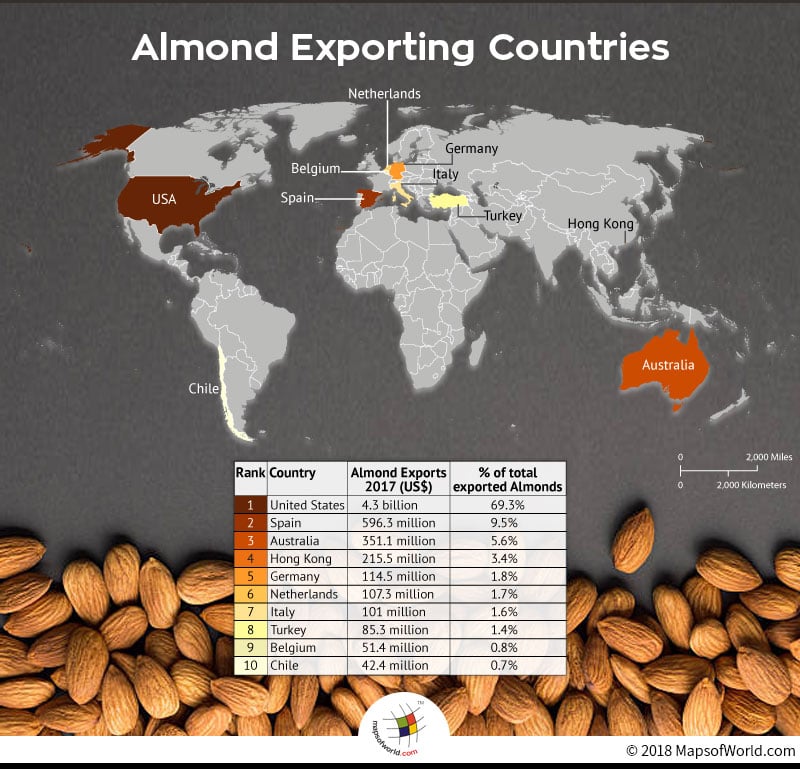

United States, accounts for the highest global almond exports. This is followed by Spain and Australia.
Referred to as the ‘Greek nut’ by the Romans, the consumption of almonds can be traced back to historical times, originating in Western Asia and Northern African regions. The introduction to the state of California in the US by the Spanish, is more recent. This has resulted in the thriving almond production growing and exporting business in the state.
The almond tree is a deciduous tree, which emerges as a viable economic crop after their third year from planting. The fruit matures in seven months after flowering. Botanically, the term ‘drupe’ is most suitable for almonds. The sweet edible type of almonds is available either shelled or without shells. Whereas the bitter kind of almonds are usually used to make almond oil, flavoring agents and liqueurs. These are inedible as they are composed of naturally occurring toxic substances; hydrocyanic acid.
The almond trees thrive in a dry and hot climate, but it cannot be solely cultivated in the tropical regions. As in the case of the United States, which accounts for the largest producing and exporting nation, exhibits the ideal type of climate for the almond cultivation. The practice of managed pollination in the state of California, has enhanced the yield and quality of the product. It accounts for 69.3% of the global exports, with net worth vale of US $ 4.3 billion.
A large consumer and second largest producer of almonds, Spain, accounts for 9.5% of the global almond exports. It is an important element of the traditional Mediterranean diet of the country. It is grown in the Mediterranean coastal regions of Catalonia, Valencia, the Balearic Islands (Mallorca), Andalusia and Aragon.
In the case of Australia, which is reported to be the third largest exporter of almonds, accounting for 5.6%, the industry is booming along the banks of River Murray. South Australia is home to 20% of the plantings of the country, which has helped it swell its production levels and fostered export rates.
Researches have shown the great medicinal value attached to almonds. The various health benefits of them are: It reduces the cholesterol levels and reduces the risk of heart diseases, due to their high content of mono-saturated fats. They are also composed of vitamin E, whose antioxidant action reduces the risk of heart diseases. They are rich in magnesium and potassium, which reduces the resistance and improves the flow of blood, oxygen and nutrients throughout the body. The presence of potassium help regulates blood pressure, and low levels of sodium, help contain the fluctuating blood pressure. It can reduce the after-meal surges in blood sugar, shielding against diabetes and cardiovascular diseases. The whole almonds with the skins, have flavonoids which offer major health benefits. Teamed with vitamin E, they are antioxidant rich and help with satiety, which aids in weight loss. Additionally, they are rich in zinc, fiber, copper and riboflavin, making them a highly recommended food.
| Country | Total exported almonds 2017 (%) | US$ |
| United States | 69.3% | US$4.3 billion |
| Spain | 9.5% | $596.3 million |
| Australia | 5.6% | $351.1 million |
| Hong Kong | 3.4% | $215.5 million |
| Germany | 1.8% | $114.5 million |
| Netherlands | 1.7% | $107.3 million |
| Italy | 1.6% | $101 million |
| Turkey | 1.4% | $85.3 million |
| Belgium | 0.8% | $51.4 million |
| Chile | 0.7% | $42.4 million |
Know more:
Related maps:
The Republic of Madagascar is an island country located in the Indian Ocean, off the…
The Euro is the official currency of the European Union. It is, however, not incumbent…
There are many countries or regions that are partially recognized by the UN, have disputes…
The Alaska Statehood Act was signed into law by President Dwight D. Eisenhower in 1958,…
The name Persia may, however, only be used to refer to Iran in some contexts.…
Hawaii is an Island State in the US. It is one of the 50 states…